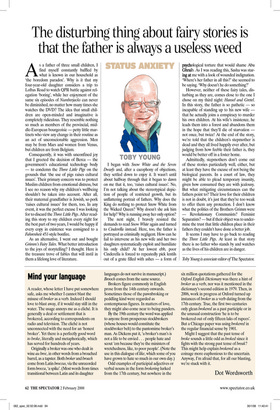Mind your language
A reader, whose letter I have put somewhere safe, asks me whether I cannot blast the misuse of broker as a verb. Indeed I should love to blast away, if it would stay still in the water. The usage annoys me as a cliché. It is generally a deal or settlement that is brokered, according to correspondents on radio and television. The cliché is not unconnected with the need for an ‘honest broker’. Yet there is a perfectly good word to broke, literally and metaphorically, which has served for hundreds of years.
Originally a broker was one who dealt in wine au broc, in other words from a broached barrel, as a tapster. Both broker and broach come from Latin broccus, via the unrecorded form brocca, ‘a spike’. (Most words from times transitional between Latin and its daughter languages do not survive in manuscript.) Brooch comes from the same source.
Brokers figure commonly in English prose from the 14th century onwards. Sometimes those of the pawnbroking or peddling kind were regarded as contemptuous figures. In matters of love, they might also come near to being panders.
By the 19th century the word was applied to anyone from prosperous stockbrokers (whose houses would constitute the stockbroker belt) to the pantomime broker’s man. As Dickens put it, ‘a broker’s man’s is not a life to be envied ... people hate and scout ’em because they’re the ministers of wretchedness, like, to poor people’. (Note the use in this dialogue of like, which some of you have grown to hate so much in our own day.) Odd examples of participial adjectives or verbal nouns in the form brokering lurked from the 17th century, but nowhere in the six million quotations gathered for the Oxford English Dictionary was there a hint of broker as a verb, nor was it mentioned in the dictionary’s second edition in 1979. Then, in 2006, work in progress at Oxford turned up instances of broker as a verb dating from the 17th century. True, the first two centuries only glean brokered as a past participle or in the unusual construction ‘he is to be brokered out of only fifteen laks of rupees’. But a Chicago paper was using brokered in the regular financial sense by 1901.
Might I suggest that the past tense of broke sounds a little odd as broked since it fights with the strong past tense of break? This might help explain brokered as a coinage more euphonious to the uncertain. Anyway, I’m afraid that, for all our blasting, we’re stuck with it.
Dot Wordsworth


































































 Previous page
Previous page